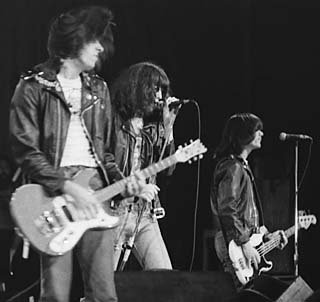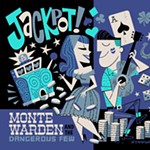Too Tough To Die
Ramones Reissues Part II: Johnny & Dee Dee
By Raoul Hernandez, Fri., Sept. 6, 2002

"We sat outside our job for two years talking about starting a band before doing it in 1974. We said we were in it till the end." -- Johnny Ramone, excerpt, "A Tribute to Dee Dee Ramone"
Everybody thinks they know the Ramones. Everybody's wrong.
Admit it. Same deal as the Rolling Stones: You stopped listening around 1978; Some Girls for the Stones, Road to Ruin with the Ramones. Both Hall of Fame benefactors coughed up catalog milestones next -- Tattoo You and End of the Century, respectively -- but scientists agree. There's only the Big Four. Peak streak, Beggars Banquet, Let It Bleed, Sticky Fingers, Exile on Main Street, and the first (hit it Dee Dee) 1-2-3-4: Ramones, Leave Home, Rocket to Russia, Road to Ruin. After that ... oblivion. The 52 years of combined recordings that followed? Delete them along with Dylan's Christian conversion and Chuck Berry's Toilet Tales.
"I agree," fires back Johnny Ramone at the initial assertion. Like Keith Richards, Johnny was always the sonic heart and soul of the Ramones. "Friends who are Ramones fans, they don't know any of the songs. There were really good songs on all the albums, but they don't know any of the stuff from the mid-Eighties on."
See? From the bangs and down-turned mouth himself. Piston-pounding, jackhammer, paint-mixing-machine guitarist. A man as blunt as his riffsmadeinheaven, vanishing breed known as Ramone. Johnny Cummings from Queens, who became instant buddies with the bowl cut across the street, Douglas "Dee Dee" Colvin. Blood brothers and neighbors more than 30 years later on the opposite coast when Dumb Dumb died of a heroin overdose in June.
Blitzkrieg bassist celebrated by his bookend stage foil on Rhino's second and new chapter of the Ramones redux, P2: End of the Century, Pleasant Dreams, Subterranean Jungle, and Too Tough to Die. The first four reissues, 2001, followed in the wake of our pal Joey's trip to the pet semetary. "You wouldn't want us to be sad," mourned the band's lifelong visualist Arturo Vega in his inscription for the singer. "But we are. We are very, very sad."
Austin Chronicle: Losing Joey was a shock, but then losing Dee Dee so soon aft-
Johnny Ramone: That was more shocking, because with Joey, I'd known he was ill. Dee Dee was a total surprise. I'd seen Dee Dee a week before on Hollywood Boulevard, and as far as I'd known, he was straight other than smoking pot. It was shocking.
AC: You and Dee Dee went way back.
JR: We were friends about five years before we started the band. He lived across the street.
AC: People still don't know some of his great songs, like "Strength to Endure" and "Main Man" from 1992's Mondo Bizarro.
JR: He wrote great songs. He wrote the best Ramones songs. He wrote great lyrics. Like I said [in my tribute], he was the most influential punk rock bassist of all time. I think. But he was a pain. He was a pain to work with. A real eccentric.
AC: What was the key to his songwriting?
JR: He'd sing about the craziest things people never sang about. Like "I Wanted Everything," about robbing a supermarket. Or "53rd & 3rd," about being a Green Beret from Vietnam and turning into a male prostitute. He sang about crazy stuff.
End of the Century
El problema with 1980's End of the Century is, of course, Phil Spector. Why hire a notorious eccentric when you've got Joey and Dee Dee, and why a producer known for his grandiloquent "wall of sound" when you invented wall of sound? Why?? Because he's Phil Spector, that's why.
"Yeah, yeah," says Johnny from retirement in Los Angeles. "I think I said somewhere [in the liner notes] that I was trying to avoid working with him. At some point, we realized we weren't having the success we thought we'd have with the first four albums, and we realized we needed to do something.
"Unfortunately, a great producer of early-Sixties pop doesn't really translate into a great producer of late-Seventies hard rock. His production worked on certain songs like 'Rock & Roll Radio' and 'Danny Says,' but on the harder stuff, songs that were mine and Dee Dee's -- 'Let's Go' and 'This Ain't Havana' -- his way was not effective. 'Chinese Rocks' came out weird. 'I'm Affected' is muddy.
"But you know, we did an album with Phil Spector, so..."
So it's genius. More or less. You can hear Spector and slave-to-pop Joey Ramone twisting the radio dial intro to one of the great opening songs in the history of two sides, "Do You Remember Rock & Roll Radio?" When the bandstand jock intones, "This is rock & roll radio, c'mon let's rock & roll with the Ramones," and the rock & roll drums pound to the foreground, it's every call to arms since Troy. The compression, the horns -- that Spector mulch. Maybe it was all worth it.
Hold on, not so fast. The succeeding "I'm Affected" and "Chinese Rocks," Johnny & Dee Dee confections? Johnny's guitar boost on the former deflates under the producer's percussive obsession, while the latter came out, well, weird -- not that it stems the song's throttling riffs for one split second. Spector's furry little head is still down in the bass drum mic for the blitzkrieg bash of "Let's Go," the cymbal crashes bewildering, but nothing can ruin this song. Joey's barking vocals and Johnny's nitro guitar will bring a tear to your eye.
"The Return of Jackie and Judy," meanwhile -- all hand claps, police sirens, and riot gear -- volleys back to Phil and Joey's court, just as "Baby I Love You" promises the frontman's gooey heart to Greenwich & Barry's pledge-all -- the Spector mystique in full effect, strings galore. Balancing this are the crushing "This Ain't Havana," as subtle as a gorilla grabbing your shirt, a re-recorded version of "Rock & Roll High School," and no-fuss budgets "All the Way" and "High Risk Insurance."
Bonus points for demos of "All the Way," lean, scrappy, great Joey growl, and the chunky goodness of an earlier "Rock & Roll Radio," which bops in stark relief to Spector's pop-handedness with hard-rock.
AC: You yourself refer to the Ramones' sound as hard rock, but you were labeled punk.
JR: We just wanted to be a wild rock & roll band. There were always punks in rock & roll, it just wasn't called that. But you know, early-Beatles, early-Elvis -- all these people -- they're punks. The Beatles were wearing leather jackets and playing in Hamburg, Germany. Elvis would be wearing his motorcycle jacket and riding his motorcycle if you go back to Jailhouse Rock. It was always like that -- Gene Vincent.
AC: This collision of pop and hard rock worked for the Ramones like no other band, but on some level, it seems like you wanted it to sound harder.
JR: I wanted it harder, but I knew it was best to have the pop songs and the occasional ballad for variety purposes. I always knew that. You get to the first Sex Pistols album, you listen to it, and it's a great album, but you gotta go, "Where do they go from here? Another album of this is going to get kinda monotonous."
So, we had the variety on our records where we had the ballads, the pop songs, the punk songs. We just needed to make sure we kept the proper balance of that stuff, and on some albums we did not have the proper balance. We get to Pleasant Dreams, and it's all pop because Dee Dee and I weren't talking.
Pleasant Dreams
If Johnny Ramone tried to avoid working with Phil Spector on End of the Century, imagine his sneer when informed that management had enlisted Manchesterian candidate Graham Gouldman to helm 1981's Pleasant Dreams. An Englishman famed for 10CC's clean, progressive pop. "I'm Not in Love" as the session's theme song -- anyone?
"They told us, basically, 'We can't find anybody else, this is the choice,'" recalls Ramone. "We were always getting railroaded into certain things. The album cover wasn't our cover. The original cover is included in there somewhere."
AC: The replacement album cover was, um, "appropriated" off an Austin artist by the name of Guy Juke. Ever heard this story?
JR: No, no. The record company called the original cover the worst cover they'd ever seen and said, "If your album flops, don't blame us." They put us in this position all the time. It was constantly like that. [The new art], someone found the picture in a book and said, "This is what we're going to go with here."
AC: How does Pleasant Dreams hold up today?
JR: I never liked it. It was never one of my favorites. It was not a good period for the band. No one in the band was talking. We were just coming off our peak, so it was still a pretty good album in that way. Pleasant Dreams was what, 1981? I have to say we probably peaked 1978-79, so it's not that far off our peak.
It belongs to their peak actually, along with End of the Century, Too Tough to Die, and perhaps the next batches redone Animal Boy (1986). If not their peak, then a second plateau of Ramonetonia no one's bothered to bother the neighbors with.
The band's first LP with individual writing credits, Pleasant Dreams is Jeffrey Hyman's -- Joey's -- fantasia. Plowing forth with the Dresden roar of "We Want the Airwaves," a storm-trooping comeback to "Rock & Roll Radio," it segues into Dee Dee's second-best Teutonic war metaphor, "All's Quiet on the Eastern Front," as good a song about NYC as Lou Reed ever shot up. Double it up with a Sheena-esque punk rocker, Joey's immortal "The KKK Took My Baby Away," and it's goose-stepping go-go boots till dawn.
Joey's alarm-clock drop kick, "It's Not My Place (In the 9 to 5 World)," visits the Four Tops on the Yardbirds, while the singer's "She's a Sensation" travels modern rock radio's hightop highway back to Laguna Beach circa 1963. "7-11" is the singer's highway fatality tale traced over the chalk outline of "Leader of the Pack," and "This Business is Killing Me" raises Pleasant Dreams' murder rate with another Joey handclapper.
Dee Dee fills in the cracks with cracks like "You Sound Like You're Sick" and "You Didn't Mean Anything to Me." The only thing missing from the band's sixth album in six years is Johnny. His co-writing credit anyway. His barrage of sound is a wet dream.
AC: Each successive batch of liner notes really unfolds the Ramones story.
JR: I read them the other day. I was finding them sort of interesting, too.
AC: According to them, the band's disintegration began with End of the Century.
JR: Yeah, that's when it started. Some people blame some other thing later on, in 1982, with some girlfriend issue -- they start blaming that for the disintegration of the band with me and Joey -- but the real disintegration started with the End of the Century record, which was prior to any personal problems between me and Joey. That's where the egos started getting too big.
AC: Was part of the problem with Joey a musical one? That you favored a harder sound while he was much more pop?

JR: Yeah, that, and his desire for commercial success. Of course I had a desire for commercial success, but I didn't want it to affect what we were doing, or do anything to upset our fanbase. I felt like some of us would have just done whatever it took to get bigger, so I fought that all the time.
Subterranean Jungle
Subterranean Jungle, 1983, is a complete wash.
"Uhhh," pauses Ramone. "I felt like we were going in the right direction. We had some stuff on it I like, but there's a lot of stuff on it I don't like. The three cover songs I'm not happy with, but 'Highest Trails,' 'Outsider,' 'Psycho Therapy,' there was stuff on it I liked."
The Chamber Brothers' hippie bomb, "Time Has Come Today"? Back to the fallout shelter. Music Explosion's 1967 chart-topper "Little Bit O Soul," first out of the gate -- too hopped-up even for these boys, skittish. Dee Dee's "Outsider" and "Somebody Like Me" are lightweighted by the production team of Ritchie Cordell and Glen Kolotin, who were hot tamales after the success of Joan Jett's I Love Rock & Roll. As Gil Kaufman's liner notes pinpoint, the album's "sole classic" is a Johnny & Dee Dee inner-city meltdown in the finest "Teenage Lobotomy" tradition, "Psycho Therapy."
Not that it made 1983 a better year for the dying revolution.
"Music sucked then," states Marky Ramone in Jungle's liner notes, this the drummer's last album for almost a decade. (He'd replaced Tommy Erdelyi after Rocket to Russia.) "It was getting watered down. Everybody was wearing stupid ties and lame-o sports jackets with a loose tie at the top. Everybody wanted to look like they worked on Wall Street. All the bands looked alike, and then those Eurotrash bands came in with their samples and drum machines and stupid echoey voices."
Add one epitaph: Hair metal.
AC: One of the bonus tracks, "Indian Giver," is a peach. Your tone is to die for.
JR: I'm pretty satisfied with "Indian Giver." I'm always very critical of the covers. I'm never really fully happy, but "Indian Giver," I'm sort of satisfied with. I thought [Joey] could have sang it a little better, but the playing, I was fine with the playing.
AC: The liner notes for Subterranean Jungle state that around this time the band gave up on commercial aspirations, but it seems to me you guys never gave up those aspirations.
JR: Yeah, I think me and Dee Dee had accepted that. I don't think that Joey and the producers had accepted that.
TTTD
If Johnny Ramone tried to avoid working with Graham Gouldman on Pleasant Dreams, imagine his sneer when informed by management they could do whatever they wanted with favorite producers Erdelyi and Ed Stasium, but they had to let Dave Stewart produce at least one song on Too Tough to Die (1984). Another hoighty-toighty English pop fanatic. Sweet dreams were not made of this.
And yet the Eurythmics frontman cut one of the gemstones of the Ramones catalog, "Howling at the Moon (Sha-La-La)," lycanthropic power pop. When spidery New Wave keys bite Dee Dee's heart-pounding bass as Johnny enters at a gallop, only Joey swinging down on the bassist's Sherwood Forest sonnet can compete.
I took the law and threw it away,
'Cause there's nothing wrong,
It's just for play.
There's no law, no law
anymore.
I want to steal from the rich and
give to the poor.
Buttressed by the heady anthemics of Joey's "Daytime Dilemma (Dangers of Love)," and Dee Dee's grown-a-conscience "Planet Earth 1988" ("the terrorist threat is a modern fear"), then polished off by the Eddie Cochran burp of Joey's blissed-out gas burner "No Go," TTTD is deathless. And that's simply side two.
Frontliner "Mama's Boy," another Johnny/Dee Dee trophy, is hard as nails, while the bassist's "I'm Not Afraid of Life" and the title track make recent events sting all the more. "Durango 95," the group's only instrumental (54 seconds), peals out, leaving noxious hardcore like "Warthog" and "Endless Vacation" in the pits. Thirty-five minutes of prime vault-ubles (the Stones' "Street Fighting Man") bequeaths TTTD as the longest of the new line at 70 minutes. Epic.
AC: Too Tough to Die, the comeback.
JR: That's why I felt with Subterranean Jungle that we were heading in the right direction, and that we finally got there on Too Tough to Die. Back to Subterranean Jungle, at least me and Dee Dee were working together again. Get to Too Tough to Die, and we weren't worried [about commercial success]. I got him away from thinking about commercial success. As a band, we were more focused again as a unit. Basically, all of us were talking then.
AC: Even the one you acquiesced to management, "Howling at the Moon," was pretty good.
JR: Yeah, it's okay. I think there's a live version that's gonna be on the [upcoming] greatest hits package. The hits package has 30 songs, eight of them live tracks, and I think there's a live version of "Howling at the Moon." It's probably better live.
AC: The hardcore stuff from Too Tough to Die carries over to '86's Animal Boy.
JR: Right, right. Animal Boy was still good. I'm not as crazy with the production, but there's still some good stuff on that. I'm pretty happy with Animal Boy.
Animal Boy
AC: How's retirement treating you?
JR: Great, I'm the happiest in my life. Playing was great, and I'm so lucky to have done that and have everyone be so nice to me -- the fans are so nice. But I don't want to get up there as an aging rock star and keep doing this when I'm past my prime. It's nice being home and watching movies and baseball, and going out to dinner. It's just relaxing.
AC: Given your playing style, have you had any problems with arthritis in your wrist?
JR: No, no. [Laughs] There's a pain in my neck from swinging my head, but that's about it.
AC: Given your retirement, I was surprised to hear you were spearheading the Ramones tribute album.
JR: Yeah, yeah. I agreed to work on it, but I needed to be fully in charge.
AC: Garbage was recently here and did their song live. It killed!
JR: On the record it's great. "I Just Wanna Have Something to Do" is one of the top five tracks on the record. The Chili Peppers were out playing, and they did their song, too, ["Havana Affair"], in Chili Peppers style. It doesn't even resemble the Ramones song, but I'm loving it. Kiss does a terrific take on "Rock & Roll Radio." It may be the best song on the record.
AC: Do you worry about being the keeper of the Ramones vaults -- that you'll always be working on another reissue?
JR: No, I love having some sort of quality control here, and not leaving it up to record companies. Now I realize what I can do. I can just say, "Yeah, fine. I want full say." I know the good stuff better than they know the good stuff. But Rhino does a great job -- I couldn't be at a better place for all our back catalog. When Rhino took over, I looked at my record collection and realized one third of my CDs were already Rhino before I got on Rhino.
AC: Is there much stuff in the vaults?
JR: I don't think so. At some point, Bill Inglot, who's done a meticulous job of making sure that the bonus tracks belong to the right sessions, the right period, is having a problem with the next group [of reissues], because by then, I started refusing to do demos. I was tired of having the record company listen to our demos and start making their comments. I didn't want to give them any additional songs, which I guess I sorta regret now, not having any extra songs laying around, but I didn't want them owning more songs.
AC: Given your bluntness about the band's albums, which ones are you really fond of?
JR: Uh, Rocket to Russia, I really like. Road to Ruin -- I like most of Road to Ruin. I like Too Tough to Die from the mid-Eighties, and I like the final album, [1995's] Adios Amigos. As far as anything from the last 10 years, that was my favorite one. I mean, I like the first four, but I like Rocket to Russia the best. Those are the ones I'd listen to. All the others, I'd have to pick out two to four songs and do my own edit.
AC: [Sigh, even Johnny ...] Last question. Any Austin memories?
JR: I love the Armadillo! The first time through was in '77, I think it was 107 degrees out. The weird thing was I got to Texas and everyone went, "Don't you love it here in Texas?" And it was weird, because I felt a little intimidated by it at first. Back in '77, it was a weird place. Then I got to love it. Then I grew to love Texas. And we have a good Texan as president! I got to love it there.
At first, they were still yelling things at you from the car. You had long hair, and in '77, things were still like that. But it was one of the first places I had been to where everyone went, "Don't you love it?" Everywhere else people would go, "Don't you hate it here?" That was the only place where everyone was loving it. ![]()








